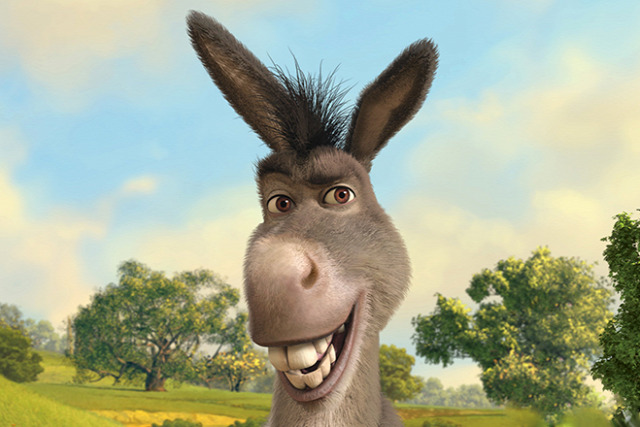While reviewing this blog and the animal music chronicled within its webpages, I discovered a glaring omission: I had yet to notate a donkey! How could I be so foolish to overlook one of the most iconic musical cries in the animal kingdom, the humble “hee-haw”?
Donkeys are a cartoonish kind of horse. They are born with buck teeth and can be coaxed into any indecent act by means of a carrot tied to a stick. In lieu of a neigh, donkeys bray. Out of the six sounds of the donkey—growl, grunt, squeal, whuffle and snort—the bray is the most musical, and even that is questionable. Here is a donkey who hee-haws in an octave.
Not all donkeys bray in a perfect octave in C. This donkey is special. Bred for pedagogy. I’ve heard donkeys bray in all different intervals—dominant sevenths, major sixths, augmented ninths, you name it.
The above sound is taken from this video where an excited donkey brays at the sight of its owner. Donkeys bray for many reasons. They’re happy, or they’re sad. They’re hungry, or they got a bellyache. They’re glad to see you, or they hate your guts. You never know with a donkey.
Donkeys have long captured mankind’s imagination, probably because of the funny sound they make. Once considered on par with horses, donkeys have fallen from grace in modern times. I mean, they’re called an “ass” for God’s sake. When Shigeru Miyamoto needed to name his bungling ape boss, he opened a Thesaurus and chose “Donkey” for his “Kong.”
According to Bezo’s newspaper:
Donkeys have a bad reputation. They’re considered stupid, and stubborn, and lowly. All of which, says Fiona Marshall, an archaeologist at Washington University in St. Louis, is unfair and inaccurate.
“Whole trade routes were built on donkeys, and the wealth of ancient Egypt depended on them,” Marshall says of the sturdy horse relatives, which were once essential for moving goods around.
But over time, donkeys became animals for ordinary women.
[source]
Sancho rode a donkey, as did Jesus. Legends say the donkey got its cross on its back from shuttling the Lord to Jerusalem. In Ancient China, donkeys had good standing and the royals were buried with their asses. To this day, Chinese consider hee-hawing a sign of respect, so be sure to do so at the next Chinaman you meet!
Donkeys are also known to sing the blues.
Does this qualify as Lynchian? It has a donkey, a violin, and a small child, which is not quite a midget. I think to truly be considered 100% Lynchian, it needs to have a midget.




